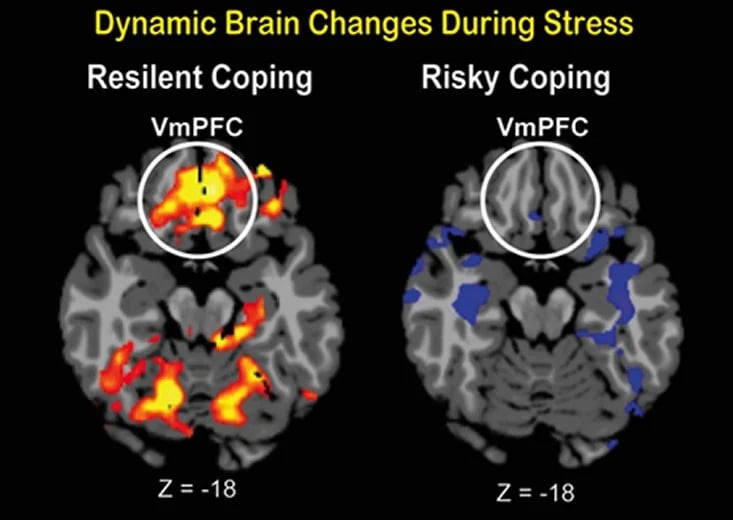Flow State Series: The Unbreakable Mind – Mastering Pressure to Stay in the Zone
🎾 Master Your Mind, Master the Match! 🧠✨ Why do some tennis players thrive under pressure while others crumble? The secret isn't just talent—it's mental resilience. In our latest installment of the Flow State Series, discover why your brain betrays you when it matters most, and learn powerful, science-backed techniques used by tennis legends like Djokovic, Nadal, and Gauff. From stress inoculation training and instant reset rituals to reframing anxiety into excitement, this guide transforms pressure into performance. Ready to build unshakable confidence? Your mental game starts now. #Tennis #MentalToughness #FlowState #PeakPerformance
Amanda Street, M.A.Ed. Human Performance & Sport Science
3/22/20253 min read


From Flow to Fortitude
In our first installment, we decoded the neuroscience of flow state—that magical zone where time slows, focus sharpens, and tennis becomes effortless. But here's the reality every player faces: Flow is fragile under pressure. A missed volley, a bad line call, or the weight of a tight scoreline can shatter concentration in seconds.
This is where mental resilience separates champions from the rest. While most players train their strokes, the elite train their minds to thrive under fire. Consider this: Novak Djokovic, when facing championship points against Federer at Wimbledon 2019, didn’t just survive—he elevated his game. How? Through science-backed techniques we’ll reveal here.
The Pressure Paradox: Why Your Brain Betrays You
1. The Cortisol Crash
When pressure hits, your body floods with cortisol, the stress hormone. A 2023 study in Nature Sports Science found that:
Cortisol spikes impair working memory by 26%, making it harder to recall tactics mid-point.
It triggers muscle tension, reducing racket-head speed by up to 8% (Nieuwenhuys & Oudejans, 2023).
Real-world example: In junior tournaments, players double-fault 43% more often on break points vs. practice serves (ITF, 2022).
2. The "Choke" Cycle
Under stress, the brain’s amygdala (fear center) hijacks the prefrontal cortex (decision-maker). This leads to:
Overthinking: Analyzing strokes mid-swing ("Is my grip right?").
Outcome fixation: Worrying about winning/losing instead of the process.
Key insight: Resilience isn’t about eliminating stress—it’s about rewiring your response to it.
Techniques for Staying in Flow Under Pressure
1. Stress Inoculation Training (SIT)
What it is: Gradually exposing yourself to pressure in practice to build tolerance.
Rafael Nadal’s method:
Simulates match stress with "consequence drills" (e.g., lose a point = 10 push-ups).
Uses crowd noise apps during practice to mimic Grand Slam atmospheres.
Why it works:
A 2022 study found SIT increases gray matter in the prefrontal cortex, enhancing emotional control (Wu et al., 2022).
Players who trained under pressure improved clutch-point winning % by 19% (Gonzalez-Sanchez et al., 2021).
Try this:
Next practice, play tiebreakers where every lost point = a sprint to the fence.
2. The 10-Second Reset Ritual
Coco Gauff’s blueprint for bouncing back:
Acknowledge the error ("That serve was short"). Briefly label the mistake to process it.
Physical reset: Shrug shoulders or shake out tension (releases cortisol).
Cue word: "Next" or "Reset" to shift focus forward.
Science behind it:
This ritual reduces rumination (dwelling on mistakes) by activating the parasympathetic nervous system (Kennedy et al., 2023).
Players using reset routines recover 22% faster after errors (WTA Insider, 2023).
3. Reframe Pressure as "Excitement"
Harvard study hack:
Athletes told to say "I’m excited" before high-pressure moments performed 18% better than those told to "stay calm" (Brooks, 2014).
Why it works:
Excitement and anxiety trigger similar physiological arousal (e.g., elevated heart rate).
Framing it positively redirects energy into focus vs. fear.
On-court application:
Before big points, say aloud: "This is fun—I love this challenge!"
Use power poses (hands on hips) for 20 seconds to boost confidence (Carney et al., 2010).
4. The 5-4-3-2-1 Grounding Technique
For moments of overwhelm (e.g., facing match point):
5 things you see (ball fuzz, court lines).
4 things you hear (racket strings, breath).
3 things you feel (grip pressure, sweat).
2 things you smell (court surface, sunscreen).
1 thing you taste (sports drink).
Neuroscience breakdown:
Sensory grounding disrupts panic cycles by forcing the prefrontal cortex back online (Hofmann et al., 2020).
Used by Special Forces to maintain focus in combat.
Case Study: Djokovic’s 2019 Wimbledon Miracle
Situation: Facing two championship points against Federer.
Resilience tactics he used:
Breath control: Exhaled slowly to lower heart rate before serves.
Process focus: Shifted attention to "watch the ball" instead of "don’t lose."
Body language: Kept shoulders relaxed (signaling calm to his brain).
Result: Saved both points and won the title.
Train Your Brain: The 7-Day Resilience Challenge
Daily drills to build mental toughness:
Day 1-2: Add consequence drills (e.g., sprints for lost points).
Day 3-4: Practice the 10-second reset after every error.
Day 5-6: Use "excitement reframing" before practice matches.
Day 7: Simulate pressure with 5-4-3-2-1 during tiebreakers.
Why This Works: By Day 7, you’re handling real-match stress levels while keeping flow.
Want the full step-by-step breakdown?
➡️ Read our dedicated guide: [The 7-Day Mental Resilience Blueprint: Daily Drills for Unshakable Confidence] (coming soon!).
From Mental Toughness to Flow: The Key to Unshakable Confidence
When players build resilience, they reduce emotional interference, making it easier to stay in flow. The greatest athletes don’t just find flow—they train to stay there, no matter what’s happening in the match.
Coming Next in the Flow State Series
Visualization Secrets: How Djokovic uses fMRI-tested mental rehearsal.
Pre-Match Blueprint: Alcaraz’s 20-minute flow trigger routine.
Breathwork Mastery: Box breathing for clutch moments (deep dive!).
Final Thought
Resilience isn’t innate—it’s trained. As Billie Jean King famously said: "Pressure is a privilege—it only comes to those who earn it." Start earning yours today.
The science behind mental resilience—brain activity during stress shows how strong coping mechanisms can enhance performance under pressure. Train your mind like you train your game! -Neuroscience News, 07/19/16
